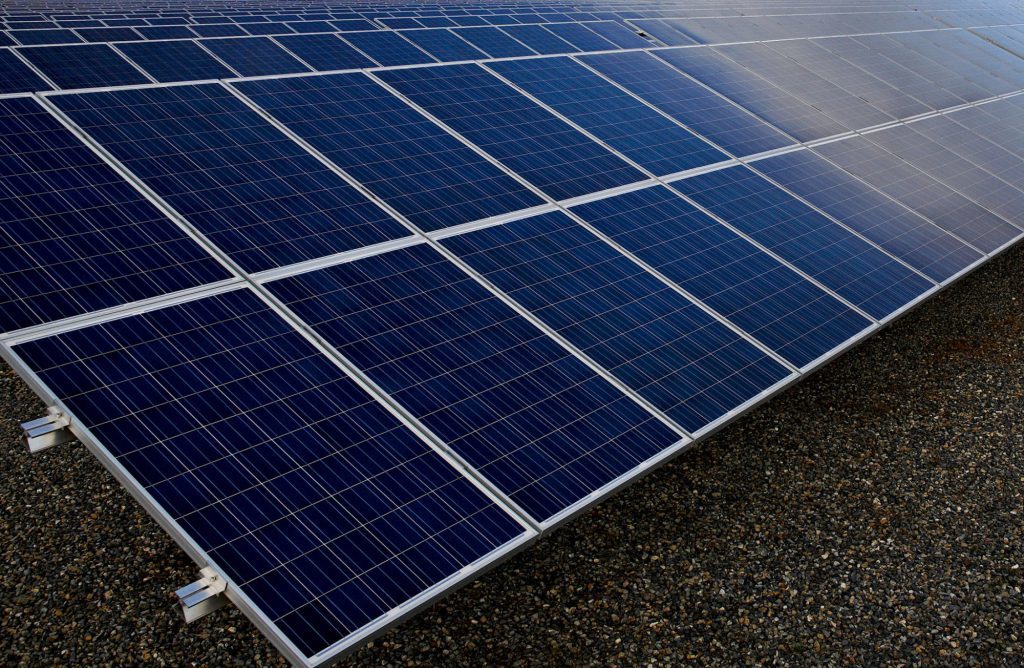
U.S. solar developers are bracing for months of uncertainty after a federal trade agency ruled that imported panels are crippling American manufacturers, giving President Donald Trump until January to decided whether to impose tariffs.
The $29 billion industry had largely expected the 4-0 decision Friday from the U.S. International Trade Commission. Even before the vote, developers were halting construction and hoarding supplies, anticipating that tariffs could sharply increase prices for imported components.
Now solar companies are left waiting as the commission prepares to send recommendations on how to protect U.S. manufacturers to Trump. The president has until Jan. 12 to decide the size, scope and duration of any tariffs. Until it’s clear how they will affect panel prices, developers will be in the dark when it comes to planning projects.
“There’s a holding pattern,” Bloomberg New Energy Finance analyst Amy Grace said in an interview.
The push for tariffs began in April when Suniva Inc., a bankrupt Georgia panel manufacturer, filed a trade complaint saying it had been crushed by a flood of imports from Asia. The company is seeking import duties of 40 cents a watt for solar cells, and a floor price of 78 cents a watt for panels, which currently average about 32 cents worldwide.
“President Trump can remedy this injury with relief that ensures U.S. energy dominance that includes a healthy U.S. solar ecosystem and prevents China and its proxies from owning the sun,” Suniva said in a statement issued after the vote.
Most of the U.S. solar industry opposes tariffs, arguing that inexpensive foreign panels have driven a boom in clean energy projects and created tens of thousands of jobs. In the end, the impact of tariffs will hinge on how much they increase panel prices. The difference between 10 cents per watt and 40 cents per watt could make or break whether a solar farm is profitable.
“Everyone is going to say: ‘What’s the number?’ ” said Joe Osha, an analyst at JMP Securities LLC.
Panels account for about 40 percent of the cost of solar farms, and even modest price swings can drag a project underwater. Matthew McGovern, chief executive officer of solar developer Cypress Creek Renewables LLC, said duties on imports could lead to fewer new solar projects.
“It’s hard to imagine that a stiff tariff would not have a deeply slowing impact,” said McGovern, whose company is based in Santa Monica, California.
Developers are not the only U.S. solar companies that could be hurt by tariffs. Panel manufacturer SunPower Corp. is based in San Jose, California, but most of its production is at factories in Mexico, Malaysia and the Philippines. CEO Tom Werner said he plans to make it clear to the White House that U.S. companies have plenty at stake.
“I’ll be going to Washington a lot,” Werner said. “We want to make sure the administration understands that we don’t want this and to try to limit the damage it could cause.”
While tariffs will drive up costs, it won’t happen immediately, and manufacturers may benefit from strong demand over the next few months. Shares of China’s JA Solar Holdings Co. and JinkoSolar Holding Co. initially sank on the news Friday, then rose as analysts said their margins may improve with higher pricing until Trump makes a decision.
And First Solar Inc. climbed to the highest in more than 16 months after the ruling. The biggest U.S. panel producer uses a different technology that isn’t included in the trade ruling.
The case is unusual — and not just because Suniva’s majority owner, Shunfeng International Clean Energy Ltd., opposes it. The case was pursued under a rarely used provision of a trade law that offers companies a “global safeguard” that can result in broad, uniform protection against imports — not just tariffs on specific countries or companies. Under that 1974 trade measure, Suniva only had to prove that imports have caused it “serious injury” — not that foreign competitors did anything unfair or illegal.
Such “global safeguard” cases were relatively popular in the 1980s and 1990s, but they fell out of favor after a string of losses. Even when the ITC sided with domestic manufacturers, presidents were often unlikely to impose a penalty.
These cases have had a resurgence under Trump, whose protectionist rhetoric may be leading companies to think he’ll support tariffs or import quotas. In addition to Suniva’s claim, the ITC has been conducting a separate global safeguard investigation of large residential washers. Still, Trump is also trying to coax the Chinese leadership into cracking down on North Korea, and so imposing tariffs may complicate that effort.
The U.S. unit of SolarWorld AG, a bankrupt German panel manufacturer, joined Suniva to argue they have been hobbled by a global glut of cheap cells. After Friday’s ruling, SolarWorld Americas CEO Juergen Stein issued a statement saying the rise of imported panels had destroyed thousands of U.S. manufacturing jobs.
“We welcome this important step toward securing relief from a surge of imports that has idled and shuttered dozens of factories,” Stein said in the statement.
Recommended for you
